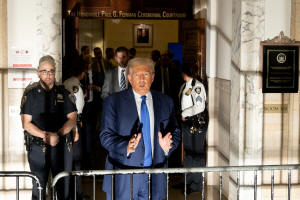Trump should be disqualified from 2024 ballot over Jan. 6 riot,
advocates say at trial
 Send a link to a friend
Send a link to a friend
 [October 31, 2023]
By Jack Queen [October 31, 2023]
By Jack Queen
(Reuters) - Donald Trump should be disqualified from Colorado's ballot
in next year's election because he "incited a violent mob" in Washington
on Jan. 6, 2021, an advocacy group lawyer argued at the opening of a
trial on Monday.
A lawsuit brought by Citizens for Responsibility and Ethics in
Washington is a test case for whether a rarely-used, Civil War-era
provision of the U.S. Constitution that bars people who have engaged in
"insurrection or rebellion" from holding federal office, can prevent
Republican Trump from being president again.
"Trump incited a violent mob to attack our Capitol, to stop the peaceful
transition of power," Eric Olson, an attorney representing voters and
the advocacy group said in an opening statement of the one-week trial
before a Colorado District Court judge.
Then-president Trump spent weeks before the Jan. 6 riot spreading false
claims of widespread voter fraud in his November 2020 election loss to
Democrat Joe Biden and encouraging his supporters to rally in
Washington. He then encouraged them to march on the U.S. Capitol where
Congress was certifying Biden's win. Only after hours of violence did he
appeal to the rioters to go home.

A lawyer for Trump, Scott Gesler, denied that Trump incited supporters
to violence and said it would set a dangerous precedent to disqualify
him based on "legal theories that have never been embraced by a state or
federal court."
"People should be able to run for office and shouldn't be punished for
their speech," Gesler told the court during his opening statement.
Colorado is regarded as safely Democratic by nonpartisan election
forecasters, so regardless of whether Trump is on the ballot, President
Biden is expected to win the state.
Trump's opponents are testing whether they have a viable path to keep
him off ballots in individual states. Trump faces similar lawsuits
brought by advocacy groups in Michigan and Minnesota. The Colorado case
is the first to go to trial.
U.S. Representative Eric Swalwell, Democrat of California, testified on
Monday that Trump's attempts to decrease tensions hours after the
violence began did little to assuage the fears of lawmakers as they
emerged from lockdown to certify the election results.
[to top of second column]
|

Former U.S. President Donald Trump attends the Trump Organization
civil fraud trial, in New York State Supreme Court in the Manhattan
borough of New York City, U.S., October 25, 2023. REUTERS/Jeenah
Moon/File Photo

"I feared that if Republicans were going to continue to challenge
the outcome, the mob would return and the scene on the floor could
become combustible," Swalwell said.
Trump is the frontrunner for the Republican presidential nomination,
according to opinion polls, in what is expected to be a rematch next
year with Biden. Trump's campaign has said the "absurd" lawsuit and
others like it are "stretching the law beyond recognition."
LONG-SHOT LEGAL STRATEGY
Trump's opponents hope to deny him a path to victory by
disqualifying him in enough hotly-contested states, but many legal
experts call the strategy a long shot.
The cases raise largely untested legal questions, and even if the
plaintiffs prevail, the final say would likely rest with a U.S.
Supreme Court dominated by a 6-3 conservative majority that includes
three Trump appointees.
The Colorado lawsuit seeks to bar the state's top election official
from putting Trump on the ballot under Section 3 of the 14th
Amendment of the U.S. Constitution, which was established in the
aftermath of the Civil War to prevent former Confederate rebels from
taking federal office.
Colorado District Court Judge Sarah Wallace has denied five separate
bids by Trump and his allies to dismiss the case, most recently on
Oct. 25, when she rejected Trump's arguments that courts do not have
the power to determine eligibility for office.
Trump faces several legal cases as he campaigns for the presidency,
including a New York state civil fraud lawsuit against his family
company. That trial began on Oct. 2. He has pleaded not guilty to
four criminal indictments, including federal cases tied to attempts
to overturn the 2020 election results and the removal and
mishandling of classified government documents when he left office
in January 2021.
(Reporting by Jack Queen; editing by Noeleen Walder and Grant
McCool)
[© 2023 Thomson Reuters. All rights
reserved.]This material
may not be published, broadcast, rewritten or redistributed.
Thompson Reuters is solely responsible for this content.
 |